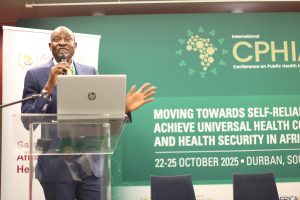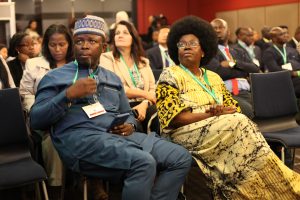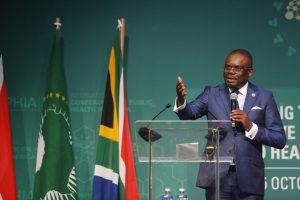*We Can’t Have African Solutions Compiled Elsewhere- African Pharma Makers
Story and Photos by John Musenze
DURBAN, SOUTH AFRICA – At the just concluded 4th International Conference on Public Health in Africa (CPHIA 2025), the atmosphere in Durban was both defiant and hopeful, health stakeholders including scientists, ministers, and pharmaceutical leaders gathered to unveil what they called The Durban Promise a unified continental pledge to achieve health sovereignty.
Beneath the declarations of self-reliance and innovation, a quieter frustration echoed through the halls of the Durban International Convention Centre. Many African manufacturers said the continent’s slow and fragmented drug qualification process which can drag on for up to six years is standing in the way of true health independence.

This is coupled with registration of patent rights for African science threatening to derail its march toward health independence.
Dr Matthias Magoola, founder of Dei BioPharma Uganda, captured both the promise and the pain of this struggle. In his keynote address on October 25th, he unveiled two landmark innovations patented mRNA vaccines for Ebola and Mpox, developed and owned entirely in Africa.
“This patent represents a breakthrough in the continent’s pursuit of scientific and economic independence,” said Dr Magoola. “It shows that Africa can invent, protect, and advance world-class biomedical technologies. We no longer wait for solutions, we create them.”
Built on messenger RNA technology, the vaccines encode viral glycoproteins in lipid nanoparticles. Unlike traditional viral-vector vaccines, they don’t require live viruses, making them safer and faster to produce.

According to Dr Magoola, Dei BioPharma’s mRNA platform could drastically reduce the time needed to respond to disease outbreaks while cutting dependence on external suppliers.
He also revealed that his patented biotechnology could reduce the cost of cancer and diabetes treatments by up to 95%, making lifesaving drugs affordable for millions of Africans.
“More than 90% of patients in Africa cannot afford these biological medicines,” he explained. “Our research is designed to change that reality.”
He appealed to the Africa Centres for Disease Control and Prevention (Africa CDC) to empower the African Medicines Agency (AMA) to independently regulate and approve locally made drugs.
“Without empowering AMA, our science will always be judged abroad,” he said. “I work directly with the US FDA because there’s no viable alternative in Africa. The whole process here is long and riddled with doubt — as if nothing good can come from Africa. That must change if we are to become truly health independent.”
Echoing Magoola’s concerns, Dr Stavros Nicolaou, Group Senior Executive for Strategic Trade at Aspen Pharmacare and Chair of the Pharmaceutical Manufacturers Association of South Africa, warned that regulatory bottlenecks and procurement policies are choking African pharmaceutical innovation.
“It is unacceptable for African manufacturers to undergo a six-year qualification process before reaching the market,” he told a plenary on local manufacturing. “We can do this in half the time.”
Nicolaou dismissed the perception that African manufacturers are uncompetitive. “Aspen is active in 55 markets, reaching patients in over 150 countries. We are the world’s leading supplier of generic anaesthetics outside the US. The problem isn’t capacity, it’s policy.”
He urged the World Health Organization (WHO) and national regulators to align and fast-track African innovation, while calling for pooled procurement of vaccines, therapeutics, and diagnostics to accelerate market access.
“We can’t have African solutions compiled elsewhere and imposed on Africa,” he said. “It won’t work.”
Experts say Africa’s fragmented regulatory landscape where each country maintains its own qualification process slows approval for even lifesaving medicines. A vaccine approved in one nation must still undergo multiple, parallel reviews across others, often for identical technical assessments.

Africa CDC Deputy Director-General Dr Raji Tajudeen described this as a structural bottleneck that holds Africa hostage to its own systems.
“A continent of 1.5 billion people should not be manufacturing only one per cent of its vaccines,” he warned. “The regulatory gap must close if we are serious about independence.”
The Durban Promise, the conference’s final outcome document, is built around five key pillars which included African manufacturing, innovative health financing, pandemic preparedness, data ownership and governance, and universal health coverage.
“Africa must move from being a passive recipient to a strategic contributor,” declared Prof. Olive Shisana, the first Director-General of South Africa’s Health Department under Nelson Mandela. “Health is not charity — it is sovereignty. It is our political choice and our economic future.”
But as delegates repeatedly noted, sovereignty cannot be achieved if African-made drugs remain trapped in regulatory red tape.
The urgency for African-led innovation was underscored by shrinking global support. According to Africa CDC, international health aid to Africa has dropped by 70% between 2021 and 2025.
“The era of aid dependence is over,” said Joe Phaahla, South Africa’s Deputy Minister of Health. “Africa must pack away its begging bowl. We must finance our own health future.”
Conference speakers proposed new domestic revenue sources including taxes on digital and informal economies, ring-fencing sin taxes on alcohol and tobacco, and expanding trade under the African Continental Free Trade Area (AfCFTA).
“If we traded more across our borders, our economies would be much stronger,” said Prof. Shisana. “We’ve got a market of 1.4 billion people — there is no reason Africa should be poor.”

Dr Jean Kaseya, Director-General of Africa CDC, acknowledged both the progress and the peril.
“We are still fragile,” he said, noting that Africa experienced more disease outbreaks in the first half of 2025 than in all of 2024. “But we are also more prepared. For the first time, Africa is inspiring the world, we are co-architects of global health.”
He urged countries to increase domestic financing, improve governance, and strengthen public health institutes. Africa CDC, he said, would deploy finance experts to help health ministries collaborate directly with national treasuries — bridging the gap between science and fiscal policy.
Still, many delegates agreed that political courage — not just technical expertise — will determine whether The Durban Promise becomes a turning point or another ambitious communiqué.
“The boldest choice Africa can make,” said Dr Serge Emaleu, a Gabonese epidemiologist, “is to tax fairly, spend wisely, and pool resources regionally for the collective good.”
The Durban Promise captured a collective dream: a continent that produces its own medicines, finances its own health systems, and commands its own data.
The CPHIA 2025 held from October 22 – 26 under the theme “Moving Towards Self-Reliance to Achieve Universal Health Coverage and Health Security in Africa”. Sustainable financing and local manufacturing were recurring subjects during the opening.
.




